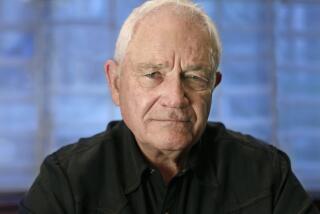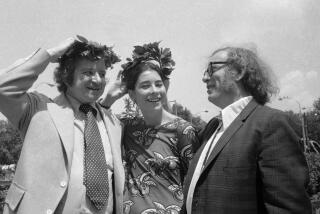Christopher Koch dies at 81; ‘Year of Living Dangerously’ novelist
Christopher Koch, one of Australia’s most acclaimed novelists, whose 1978 thriller “The Year of Living Dangerously” illuminated the political and cultural turmoil in Indonesia after World War II, died of cancer Monday in Hobart, Australia. He was 81.
His death was confirmed to Australian news media by his agent, Margaret Connolly.
During a 55-year career, Koch wrote at least eight novels, which often explored Australians’ engagement with their near-neighbors in Asia. “Highways to War” (1995), for instance, revolves around a combat photographer from the Australian island state of Tasmania who disappears in Southeast Asia. It is considered one of Koch’s most accomplished works.
But Koch, which he pronounced “kosh,” was most often identified with “The Year of Living Dangerously,” a political drama set in Indonesia during the violent period leading up to the overthrow of the Sukarno regime in 1965. It was made into a highly regarded 1983 film directed by Peter Weir and starring Mel Gibson, Sigourney Weaver and Linda Hunt, who won the best supporting actress Oscar for her mesmerizing portrayal of a male photographer named Billy Kwan.
Koch had mixed feelings about the fame resulting from the movie.
“If a book is made into a film, they hang it around your neck forever,” he told the Weekend Australian newspaper last year. But he acknowledged that the best-selling book “saved me from sinking into obscurity. So, I’ll never put it down. I just get a bit sick of the film being lumped in all the time.”
Born in the Tasmanian capital of Hobart on July 16, 1932, Koch left school at 15 and worked in a bookstore, where he availed himself of the opportunity to read James Joyce’s “Ulysses” and other classics. He was fired after being caught too many times reading books instead of selling them.
Later, at 17, he worked for the Hobart Mercury newspaper as an artist and occasional cartoonist before returning to school to study English, philosophy and history at the University of Tasmania. While still a student, he published his first poem in The Bulletin magazine.
In 1958, after roaming India and Europe, he published his first novel, a coming-of-age story called “The Boys in the Island.” Armed with good notices, he went to California in 1960 for a writing fellowship at Stanford University, where his classmates included Larry McMurtry and Ken Kesey.
After his year at Stanford, he returned to Australia and spent more than a decade as a writer and radio producer for what is now the Australian Broadcasting Corp. He quit in 1972 to gamble on writing fiction full-time. “People thought I was crazy,” Koch, who had just turned 40 and had a wife and young child, recalled in the Weekend Australian interview.
Inspired by the experiences of his younger brother Philip, a foreign correspondent, Koch began to explore Asia. “The Year of Living Dangerously” was based in part on his brother’s tales about covering the tumult in Indonesia. The novel’s provocative title came from a speech by President Sukarno, who said 1965 was the year Indonesia would end its dependence on the West. That year, Sukarno was ousted in a military coup.
Weir, the Australian director of “Picnic at Hanging Rock” and “Gallipoli,” was slow to embrace the novel but once he did he found that he couldn’t put it down. He bought the film rights and worked on the screenplay with Koch, who is credited as co-writer along with Weir and David Williamson.
According to Weir, his relationship with Koch was bumpy from the start because of the author’s doubts that his novel could be successfully translated into film. Koch also was shocked by Weir’s choice of Hunt to play the crucial role of Billy Kwan. “My feeling was that it was worth a gamble,” Weir told the New York Times in 1983. “But can you imagine how horrified Chris Koch must have been to hear that a woman was going to play his precious creation?”
Koch had a restless quality, which led to a life of constant relocation, both within Australia and overseas. Much of his moving was motivated by a desire to get away from his native Tasmania, which he said was too isolated and provincial. Yet he frequently returned to the island, which figured in most of his novels, including last year’s “Lost Voices.”
“Koch has an extraordinary power of evoking place,” novelist and critic Graham Greene once wrote, “and I feel now that Tasmania is part of my memory.”
Koch is survived by his second wife, Robin; his son from his first marriage, classical guitarist Gareth Koch; his brother, Philip; a sister, Susan; and grandchildren.
More to Read
Start your day right
Sign up for Essential California for the L.A. Times biggest news, features and recommendations in your inbox six days a week.
You may occasionally receive promotional content from the Los Angeles Times.







